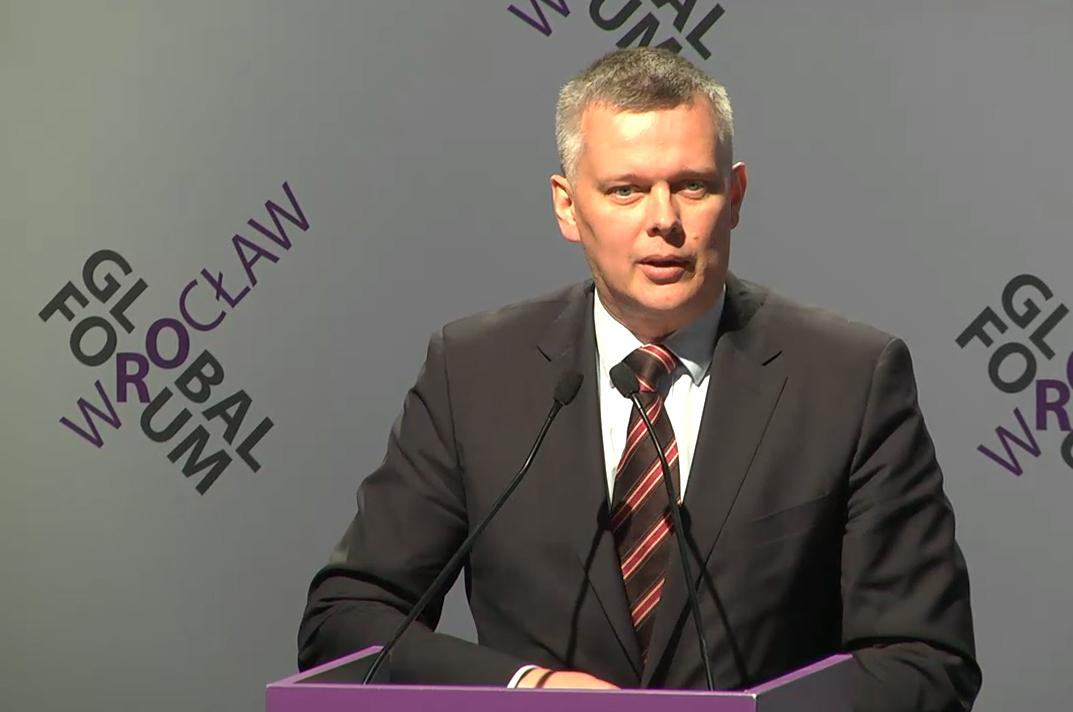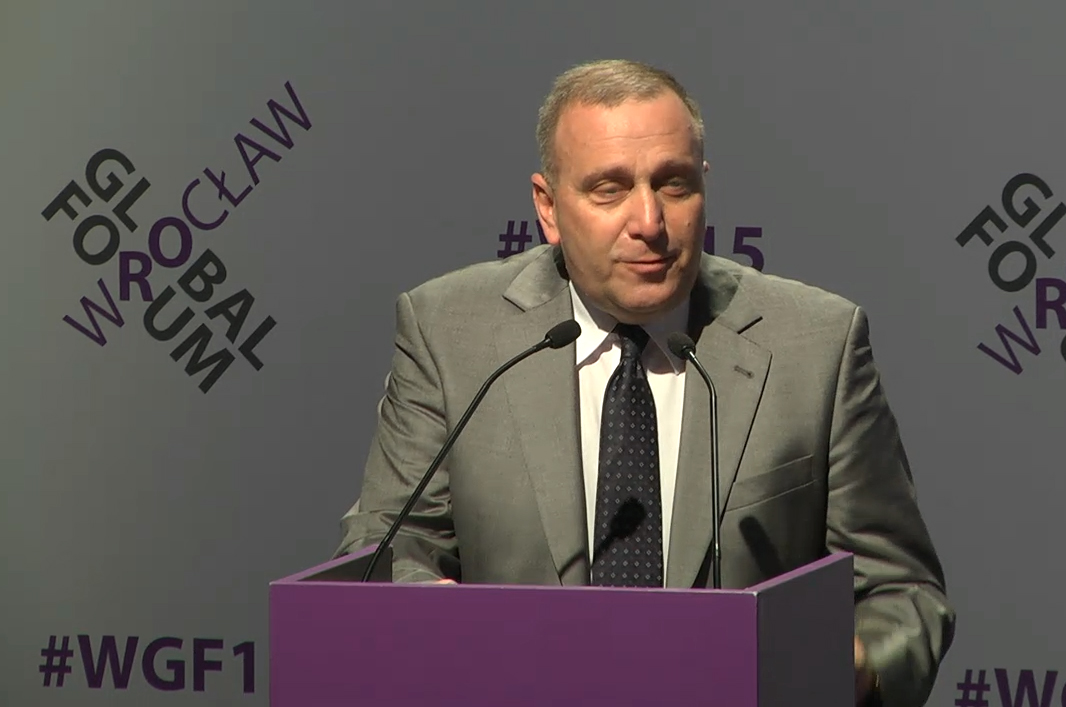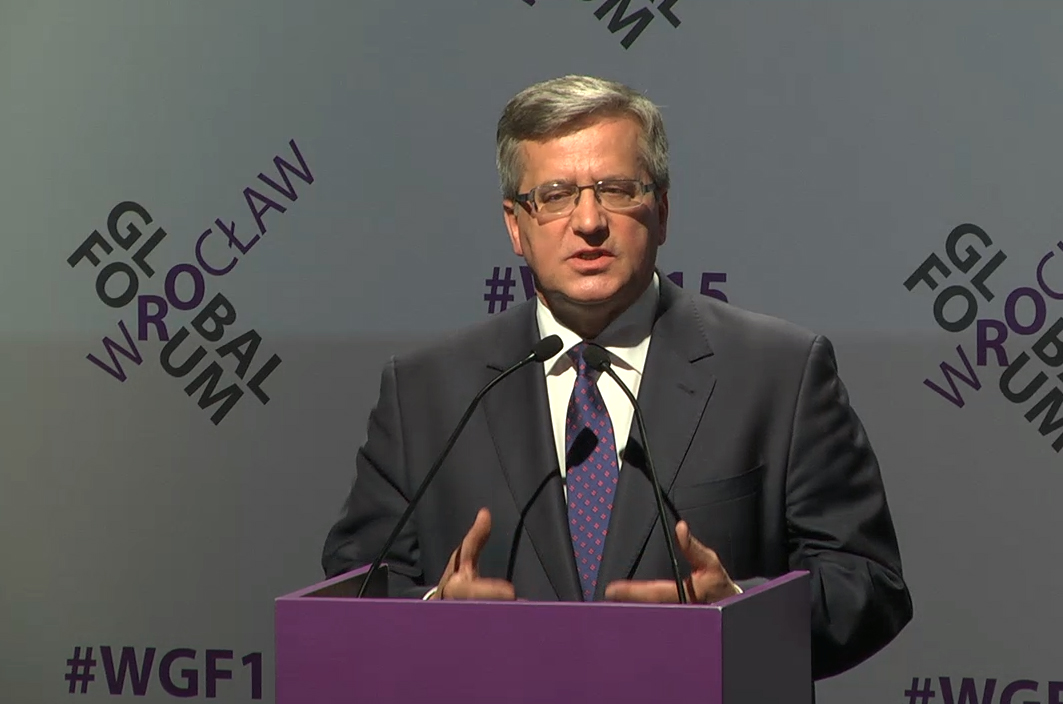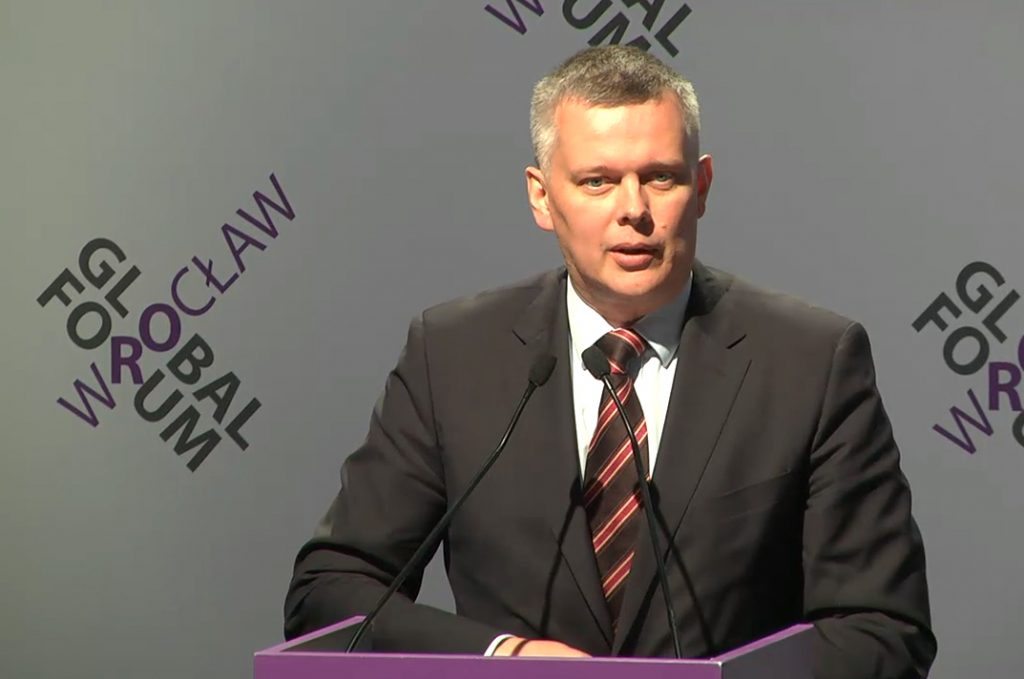
Officials stress they don’t seek confrontation with Russia
Top Polish officials June 12 exhorted the transatlantic community to show solidarity with countries bearing the brunt of Russia’s aggression, but stressed that they do not seek a confrontation with Moscow.
“The European response to the situation in the east can be driven as much by our values as by our interests,” said Polish Foreign Minister Grzegorz Schetyna.
Poland’s President, Bronisław Komorowski, and its Deputy Prime Minister, Tomasz Siemoniak—who also serves as Defense Minister—joined him in calls for solidarity. All three spoke at the Atlantic Council’s Wrocław Global Forum in Wrocław, Poland.
“An independent, prosperous Ukraine with a healthy economy will be a stabilizing force for the EU borders,” Schetyna said, insisting that political and economic aid to Kyiv is not merely a moral duty. “Ukraine deserves a better future and she needs our solidarity.”
Ukraine is one of six post-Soviet countries that comprise the EU’s Eastern Partnership initiative. The other five are Armenia, Azerbaijan, Belarus, Georgia, and Moldova.
“The Eastern Partnership is not, and will never become, a pawn in the zero-sum game with Russia. We do not seek confrontation with our eastern neighbor,” said Schetyna. “As much as we hope for a political solution to the crisis in Ukraine, we also look forward to re-establishing normal working relations with Russia after she turns to respecting international norms.”
Siemoniak said Russia’s March 2014 annexation of Crimea and its support for separatists in eastern Ukraine have challenged the belief that there were no serious military threats along the EU’s eastern front.
“The Russian Federation, allowing the use of armed forces to keep political influence in the region and introducing their new methodology for running military conflicts on the basis of hybrid measures, challenged NATO, and we have to face up to this challenge,” he said.
 “The Eastern Partnership is not, and will never become, a pawn in the zero-sum game with Russia. We do not seek confrontation with our eastern neighbor,” Polish Foreign Minister Grzegorz Schetyna.
“The Eastern Partnership is not, and will never become, a pawn in the zero-sum game with Russia. We do not seek confrontation with our eastern neighbor,” Polish Foreign Minister Grzegorz Schetyna.
At the Wales Summit in 2014, NATO leaders established a quick-reaction military force to respond to new challenges on the alliance’s southern and eastern borders. This “spearhead” Very High Readiness Joint Task Force (VJTF) is conducting live exercises for the first time in Zagan, Poland. More than 2,100 troops from nine NATO nations, including the United States, Germany, and the Netherlands are participating in the exercises, which end June 19.
“The strengthening of the eastern flank of the alliance is seen as a new normal,” said Siemoniak, urging NATO to make structural decisions that will “guarantee the alliance better capabilities of strong reinforcement of eastern countries in case of growing threat.”
The 28-member military alliance must increase the credibility of conventional deterrence while keeping collective defense as a priority, he added.
Schetyna warned against letting the Organization for Security and Co-operation in Europe (OSCE) lose its relevance as a platform for dialogue on security and stability in Europe.
“OSCE has been one of the very few instruments which we can actually use to limit the scope of violence in eastern Ukraine,” he said.
Russian-backed separatists in eastern Ukraine have prevented OSCE monitors from verifying compliance with a ceasefire brokered in Minsk by blocking access to territory under their control.
“NATO must strengthen strategic thinking in eastern policy. That is about a new… realistic policy vis-à-vis Russia… There was too much of wishful thinking,” said Siemoniak.
He also said NATO must engage more in the defense sector reform process in countries like Ukraine, Moldova, and Georgia that are focused on European integration.
The transatlantic bond
Siemoniak emphasized the importance of the transatlantic relationship in reinforcing NATO.
“It is not possible to keep the military efficiency and effectiveness of the allies without a strong transatlantic bond,” he said. “The basis of this bond has been real engagement of the United States in European security.”
However, he said, the US presence in Europe is not unconditional. “Europe must be able to positively respond to American expectations connected with slowing down the drop and then gradually increasing defense spending,” he added.
In 2016, Poland will reach NATO’s 2 percent of GDP defense spending target. Siemoniak and Schetyna urged other European nations to do so as well.
The 2 percent level is an “absolute must,” said Siemoniak, adding that Poland takes this commitment very seriously.
A ‘civil war on our doorsteps’
Europe today faces multiple complex challenges, including “civil war on our doorsteps,” hundreds of thousands of refugees pouring out of failed states in the Middle East and North Africa, and Russian aggression in the east, said Schetyna.
To combat these threats, the EU must forge a joint strategy while highlighting the advantages of global trade liberalization, he said.
“I am well aware that there is no magic solution to the challenges ahead… It will require more leadership from the whole democratic… free world,” Schetyna said, adding that the EU should establish itself as an engine of economic growth.
Schetyna said two free-trade agreements being negotiated by the Obama administration could energize the global economy. The Trans-Pacific Partnership (TPP) includes the United States and 11 other countries, while the Transatlantic Trade and Investment Partnership (TTIP) links the United States and the 28-member EU.
“Importantly, TTIP can raise transatlantic relations to a higher level of economic and political cooperation, supplementing the close military alliance between Europe and the United States,” said Schetyna.
Forging solidarity
Komorowski said Poland should aim to forge solidarity with countries to its east, including Ukraine.
“Today we have wasted a quite a lot of time in which natural enthusiasm for integration of the Western world has been replaced by the sense that being within certain frames doesn’t require solidarity, but it is only an opportunity to make business, to have [a] better life,” the Polish President said.

Poland’s President, Bronisław Komorowski, emphasized the need for solidarity in Europe.
Komorowski pointed to recent surveys in Poland in which respondents questioned the readiness of certain European structures to defend other NATO member states.
“These polls have to be treated a signal that this … solidarity needs to keep being built and strengthened all the time,” he said. “Otherwise, the foundation for our freedom, also our Polish freedom regained twenty-five years ago, may appear in a moment of crisis to be a weak foundation.”
Ashish Kumar Sen is a staff writer at the Atlantic Council.
Image: “NATO must strengthen strategic thinking in eastern policy. That is about a new... realistic policy vis-à-vis Russia… There was too much of wishful thinking,” Polish Deputy Prime Minister and Defense Minister Tomasz Siemoniak said at the Atlantic Council's Wrocław Global Forum in Wrocław, Poland, June 12..
